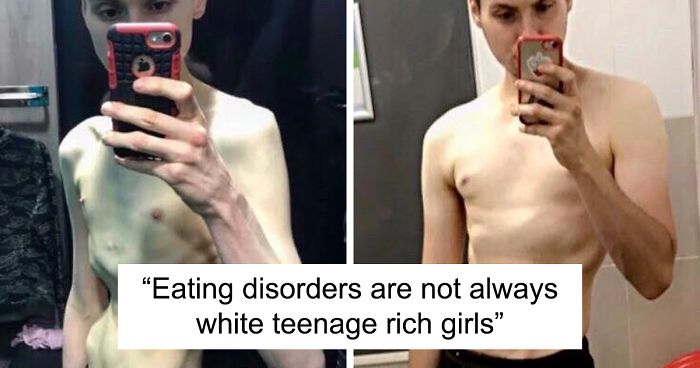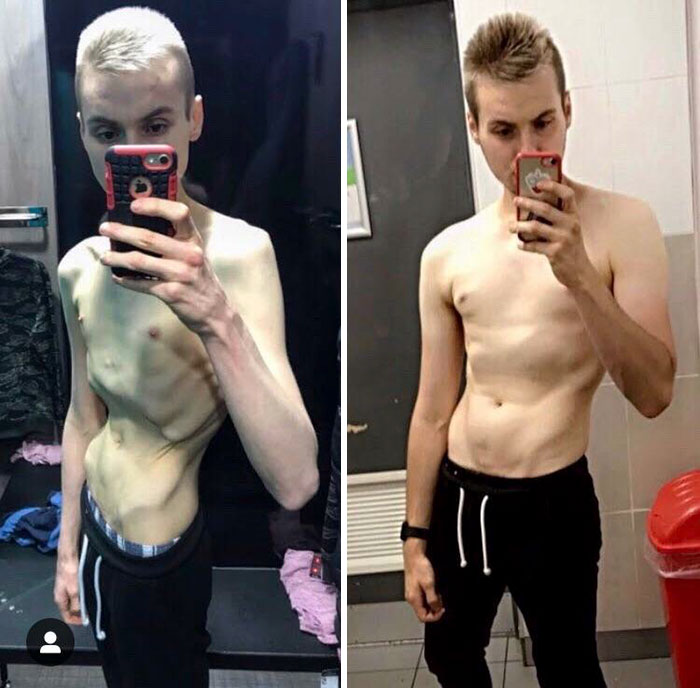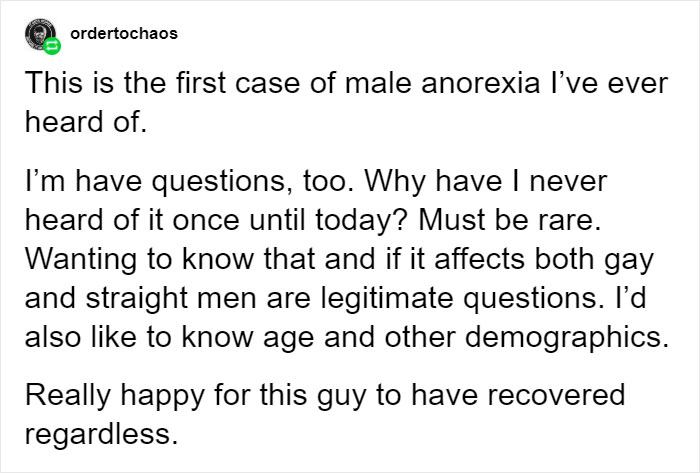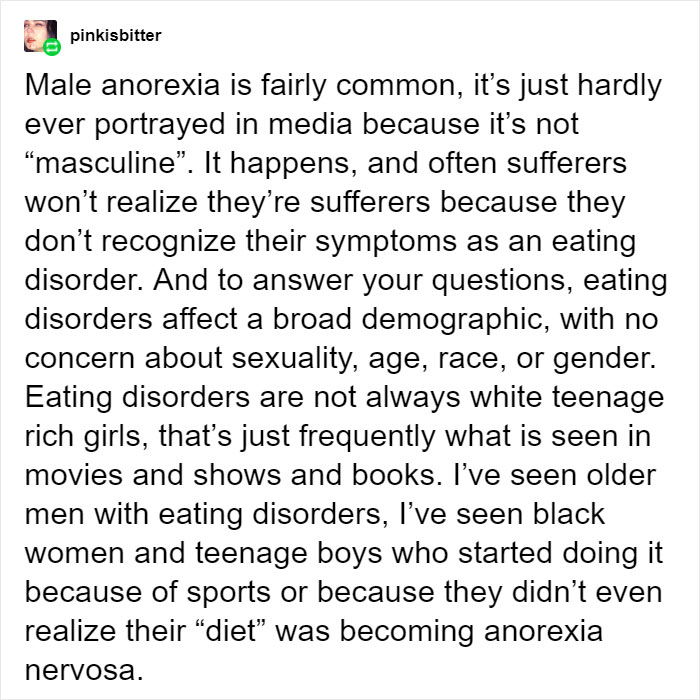
People Have To Explain Guys Can Have Anorexia Too After A Before-And-After Pic Leaves Some In Disbelief
Interview With ExpertAnorexia and other eating disorders can affect anyone, no matter their beliefs, background, or gender. However, far from everyone understands that people don’t choose their illnesses. And some people even think that men (especially straight men) can’t have anorexia. Let me repeat that: there are people out there who believe that if you’re a man, you can’t have anorexia. What’s next—someone stating that women can’t have Obsessive Compulsive Disorder?
Andrew G. posted his before and after comparison pics of himself when he was anorexic versus how he looked after he conquered the condition and started looking like an athletic superhero. The internet’s reaction was incredibly supportive and Andrew was an inspiration for many people who were dealing with anorexia. However, when the story hit Tumblr, some internet users felt the need to make fun of Andrew, anorexia-sufferers, and men.
Bored Panda spoke to Catherine Cook-Cottone, a Professor of Counseling, School and Educational Psychology from the University at Buffalo, to learn more about anorexia, how it is perceived in society, as well as what people can do to overcome it.
“Men are also at risk for disordered eating. The risk appears to be somewhat lower, but that does not mean that it doesn’t happen,” Professor Cooke-Cottone explained to Bored Panda. “Anorexia nervosa is a very dangerous disorder with a relatively high mortality rate when compared to other disorders.
“It is dangerous to assume that men are not also at risk as you might miss supporting someone who desperately needs support.”
Andrew beat anorexia and showed off his progress to the world!
Image credits: andrewg06
He was very proud of what he achieved
Image credits: andrewg06
Image credits: libertarirynn
However, some people couldn’t believe that men can have anorexia…
Image credits: libertarirynn
…and this instantly started a serious discussion
Image credits: libertarirynn
Image credits: libertarirynn
Image credits: libertarirynn
Image credits: libertarirynn
Those who want to overcome anorexia need medical, psychological, and nutritional care
According to Cook-Cottone, there are three things that people suffering from anorexia need to do if they want to get the illness under control: medical, psychological, and nutritional care.
“Medical Care: a medical doctor who knows Anorexia nervosa and can make sure you are physically okay. Most doctors do not have specialized training, so be sure to find someone with training.”
“Psychological Care: secure a competent mental health professional who has training in working with eating disorders. This person can help you work on goals for not only your physical wellbeing but your emotional and relational wellbeing,” the Professor explained.
“Find someone who knows about positive embodiment and getting back to being in and of your body in a positive way—this means finding healthy places to be in your body—like a body-positive yoga study, hiking, and getting back to the full experience of your body.”
She continued: “Make sure they ask you about your goals and dreams in life and help you think about building up the parts of you that are not aligned with the disorder.” According to the professor, the point of this is to shut down behaviors and thoughts linked to anorexia.”Recovery is about getting back to effectively living your life.”
Nutritional care is just as important as medical and psychological support. “Find a nutritionist that not only knows about working with eating disorders—they also know about intuitive eating and getting back to being with food in a nourishing and healthy way, as well as how to honor your body and what it needs, not only to survive but to flourish.”
The professor suggested that a holistic approach was the best way to beat anorexia
“This three-armed approach should be a team that is willing to work together, consult with each other and support your recovery. For some people, they may need day treatment or inpatient care—your team will know what is right for you,” Professor Cook-Cottone said. “The goal is to end the ongoing and dangerous fight with your body that stunts physical, emotional, and relational wellbeing and back to being in and of your body in a way that allows you to thrive physically, emotionally, and in relationships—to be in and of your body so you can get back to your goals and dreams.”
“We call the balanced approach Positive Embodiment—you not only work to end the symptoms—you work to create a full life that does not include the eating disorders. I have a book coming out next year with Norton on Positive Embodiment and the Treatment of Eating Disorders. It is a holistic approach that includes patients’ wellbeing, hopes, and dreams and honors the struggle they have experienced and what got them where they are (trauma, hurt, sensitivity to emotions),” the Professor said. “It’s actually a very beautiful process to watch as those who are lost in the disorder begin to explore their reason for being, get back to feeling all their feelings, and get back to making choices from their hearts and minds rather than from a place of perfectionism and avoidance. I truly love the work.”
Anorexia may have a genetic component to it as well
Some researchers have stated that anorexia isn’t just a mental illness, but has a genetic component as well.
For example, a study headed by researchers at King’s College London and the University of North Carolina at Chapel Hill has indicated that recovery rates from anorexia might be low because it is partly a metabolic disorder. In other words, it’s not all just in someone’s head.
Anorexia nervosa leads to a dangerously low body weight, a warped body image, as well as a huge fear of gaining weight. The condition, which has the highest mortality rate of any psychiatric illness, affects 1 to 2 percent of women, as well as 0.2 to 0.4 percent of men.
Researchers used data collected by the Anorexia Nervosa Genetics Initiative and the Eating Disorders Working Group of the Psychiatric Genomics Consortium. They analyzed data from 16,992 anorexia cases and 55,525 controls, all from 17 different countries.
According to the researchers, anorexia is in part a metabolic, in part a psychiatric disorder that has similarities to OCD, depression, anxiety, as well as schizophrenia.
Here’s how some people reacted to others not knowing that men can have anorexia
Mental health awareness is really important. I think the question (while a little tactless) shows that male stereotypes are still pretty destructive... no one is immune from body image issues or the myriad of self destructive spirals that can ensue.
It’s because men aren’t meant to talk about their feelings, they often get forgotten when it comes to mental illness even though statistically men are more prone to mental health issues. We as a society need to take away the taboo of men speaking up.
It's gradually improving - at least in the UK. One thing that social media is good for is sharing and the more people share these kinds of life stories the better. Knowing you aren't alone can make the difference between getting help or not.
Load More Replies...Mental health awareness is really important. I think the question (while a little tactless) shows that male stereotypes are still pretty destructive... no one is immune from body image issues or the myriad of self destructive spirals that can ensue.
It’s because men aren’t meant to talk about their feelings, they often get forgotten when it comes to mental illness even though statistically men are more prone to mental health issues. We as a society need to take away the taboo of men speaking up.
It's gradually improving - at least in the UK. One thing that social media is good for is sharing and the more people share these kinds of life stories the better. Knowing you aren't alone can make the difference between getting help or not.
Load More Replies...























201
63